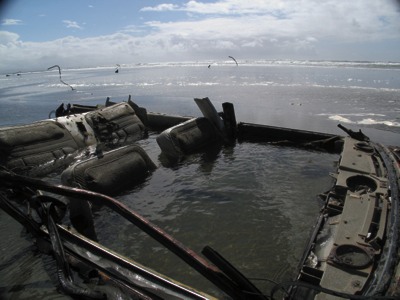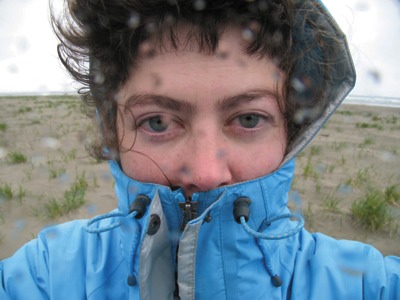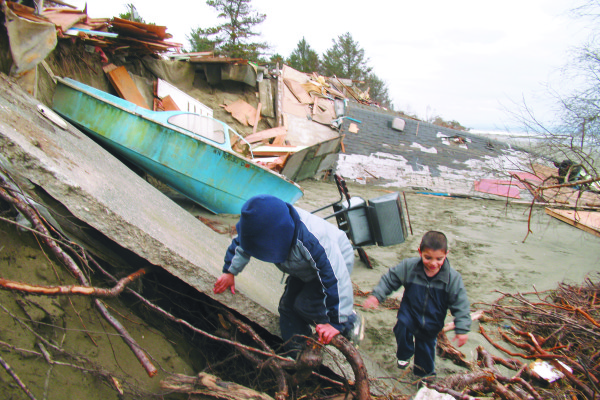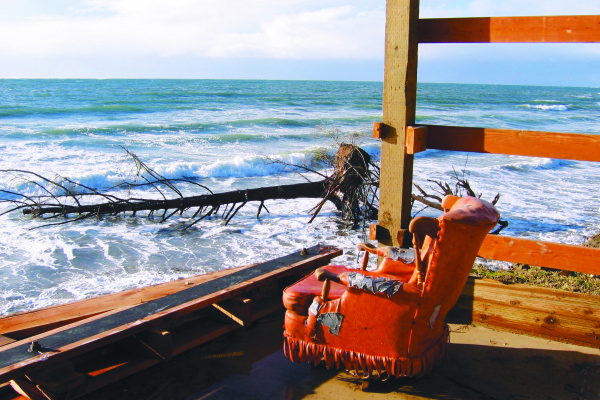Story and photos by Erika Langley
Last winter the beach property I’d enjoyed for 12 years fell into the ocean. While it was a shocking experience, it was not a surprise. You see, my beach property was in a place called Washaway Beach.
The area once known as Cape Shoalwater on the Washington Coast, now properly known as North Cove, and nicknamed Washaway — is one of the fastest eroding places in our hemisphere. It loses an average of 150 feet a year. In a bad winter, it can be much more.
The phenomenon began in the late 1800s. North Cove was supposed to be a luxury destination for train travelers between Seattle and Portland. It was a town with brick buildings, a Coast Guard station, a clam cannery and fine homes. The whole town fell into the ocean, one by one, and nothing could stop it.

Theories vary as to why. The damming of the Columbia River at that time changed how sand moves around, or “sediment accretion” as the coastal geologists like to say, which is fancy talk for how all our sand is moving to Long Beach to the south of Washaway. There is also the possibility that dredging of a ship channel by the Army Corps of Engineers, well into the 1970s, didn’t help matters. Or it could just be that this part of the state wants to stick out like a big nose. The ocean is a relentless plastic surgeon.
Needless to say, my place was cheap: $15,000 for three 50 by 100 foot lots. The first lot had four trailers in various states of rust, two shacks and an outhouse. The second lot was a wetland swamp, a black lagoon with Spanish moss hanging off the trees, emanating the sounds of bird song and frogs. The Third Estate was empty with a few trees. I figured I’d move my encampment there when the time came. There was no water, only power. It was the only thing I have ever been able to afford. I had to sign an agreement with the seller, saying I was aware of the phenomenon of erosion. And I was. I always knew what I was stepping in.
One of the first people I met was my neighbor Stanley Sabre. He came by in a True Value baseball cap and asked how much I paid for the place. I told him, adding brightly, “Maybe I’ll get 10 years!”
“Maybe you’ll get five years,” Stanley said, ominously. He told me to get a tide book, and to pay attention to it. If there were ever 9- or 10-foot tides, I should be here. Because here, there is a chance to see the ferocity of nature from a ringside seat. This turned out to be invaluable information.
My neighbor Ray Miller was on his third property at Washaway, his two previous estates under water. He called me “Kiddo” and reminded me of my handy, late uncle Bud. He had drills and ladders and could fix a cheap chainsaw. “Anything you need, Kiddo, just holler.” Eventually I hollered and Ray offered to cut my grass on his riding mower for a weekly sum of $10 and a 6-pack of Bud Lite. What a rewarding investment that was! One time my car died at Washaway, and I was surviving on the dubious provisions available from the walkable Minit Mart. Ray brought me, in installments, a big piece of Chinook salmon, two potatoes and two beautiful ears of Yakima corn.
“Where’s my dessert?” I asked.

I live in Seattle, but I felt, and feel, a hypnotic pull to the area. It is frightening, humbling and moving to be in a place that’s so beautiful and violent at the same time. It will break your heart even when you know better. Just try to resist, denial is delightful. A day here is like no other, mainly because there are so few people, you can have your own moon-planet.
I always knew I was a guest here, so I made a point of having a fabulous time. I built a fire pit and grilled salmon on it on summer nights. I planted foxgloves that grew as high as my trailer. I wallpapered my cook-shack with the wrappers of fireworks found on the beach. I would look out at my stately alder trees, rustling in the ocean wind, and feel at peace in a place I knew was doomed.
I would watch it happen, storm by storm. I met Juanita and her 18-year-old son Ray, screamingly funny, smart people who became dear friends. It was late March 2010, they were waterfront but it seemed they’d dodged a bullet and would get another year. On March 31, Juanita’s birthday, she bolted into Ray’s room during a storm.
“This is not a drill. Get your stuff and get out.” Just like that, in one night, their yard, treehouse, deck, giant trees and house all fell in. The shock and grief of it was something I was unprepared for, even having photographed countless places falling in. Now it was personal.
My neighbor Stanley and his wife, Resha, always took the long view. “Don’t you want this to last forever?” I asked Stanley.
“It already has. Today.” he said. “Where else would I want to be? With all these earth changes, we’re right here at the point of attack.”
They were both in Vietnam, and I admired the hard-won Zen wisdom of survivors they had acquired. They were embracing the uncertainty. I asked Resha if she was experiencing the anxiety and dread. She said she got her grieving mostly over with two years ago and was really trying to focus on savoring. She told me that my worrying might actually make things worse for me. “You need to be present and in the moment, so you can make good decisions when the time comes,” she told me.
In 2012, after a bout of winter storms, all my neighbors became waterfront: Ray, Stanley and Resha, and my neighbor Craig, who wore shorts as a badge of pride all winter long. Combined, they were a neighborhood watch of full-time residents. I would come down by myself all the time. No one ever messed with me or my stuff. This, as is turns out, was due entirely to them.
 2012 was an ominous year. That is when I moved my nicest trailer, a 1960 Airstream, to the property of some friends, Marcy and Bob, in the Less Doomed part of Washaway, where people build real houses. But then things settled down. My neighbors got to enjoy being waterfront longer than most.
2012 was an ominous year. That is when I moved my nicest trailer, a 1960 Airstream, to the property of some friends, Marcy and Bob, in the Less Doomed part of Washaway, where people build real houses. But then things settled down. My neighbors got to enjoy being waterfront longer than most.
Last fall there was evidence that our luck was running out. Craig’s property, behind mine, began eroding dramatically. Though he obscured my view, his place was a barrier between me and the end of my place. I never wanted to be waterfront.
Craig’s house fell in during a howling November wind storm. By then, the rest of us were thinking about packing, planning. You think you’ll have some time. It seems like it’ll be a natural disaster in slow motion, but it’s hard to believe how quickly it can happen. I figured I’d move my remaining trailers to my Third Estate.
The week of Dec. 8, three big storms blew through. Stanley and Resha’s place, another neighbor and Ray’s place were all destroyed. Ray, being across the street from doom, thought he had some time, but then the storm came from two sides, and he had to evacuate. Half my property fell in: my outhouse and shed, my stately trees.
“I don’t think you’re going to have to worry about cutting the grass,” Marcy told me.
When I got there, my power had been turned off. I called Grays Harbor PUD. “This is unacceptable,” I said. “I am still here.”
They came out immediately but seemed concerned for my safety. “Are you staying here tonight?” one asked. “Have you got a gun?”
That seemed a curious question. “No,” I said. “Why?’”
“There’s tweakers everywhere, coming out of the woodwork, ripping stuff off. It’s a free for all.”
Tweakers are, of course, the wild-eyed, scab-faced devotees of crystal meth best known for theft. I thought the guy was just trying to scare me. But, look! People had already started to rip me off. Firewood: gone. Rain barrels: gone. The cute birdhouse in the shape of a trailer my friend Sue got me? Gone.
My property was still half-there, the glass half-full, but no one was respecting the protocol of leaving places alone until they’re on the beach, and no neighbors were around anymore to enforce proper decorum. Two skinny, sketchy guys came lumbering through my yard, carrying a big piece of metal pipe.
“Hey, this is private property. No trespassing,” I said. They shrugged, mildly inconvenienced. But for the first time in 12 years, I felt afraid and alone there.
I moved out all the irreplaceable treasures that could reasonably fit into my modest storage unit in Seattle, otherwise known as my dead Honda Accord. I had my friend Bob take the beautiful leaded glass windows and Craftsman door off my cook shack, leaving it wide open. You can’t steal from me, I’m giving everything to you!
Ray moved with his girlfriend to Tokeland, Craig to Grayland, Stanley and Resha back to Seattle, with their eye on New Mexico. Just like that, a community got scattered to the winds.
My place hung in there for a long time. Ultimately, the cookhouse did not sink into a roiling, churning high tide, but fell flat on its face on the beach on a nice day in broad daylight, like I once saw a really drunk lady do at Washaway. Moving my compound to my third lot wouldn’t have worked, as all three of my properties eroded at the same time.
An old woman I met on the beach once told me she keeps coming back here for the smell. I still come for it too: the intoxicating brew of ocean and sand, mossy trees and salt. I grieve for the loss of my sanctuary, but I still love it here. The message here for me is about savoring. If you knew for certain that something wouldn’t last, you would make a point to really, really enjoy it, to be grateful, to pay attention. This is fragile beauty in uncertain times. It lasted forever already, today.
